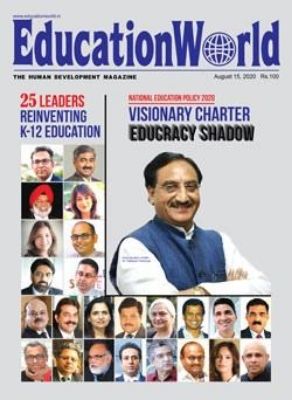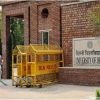No products in the cart.
Dr. KR’s high hopes
 Thank you for the August issue of EducationWorld. Your own take on NEP 2020 deserves compliments for its balanced assessment and objectivity.
Thank you for the August issue of EducationWorld. Your own take on NEP 2020 deserves compliments for its balanced assessment and objectivity.
The concern over implementation, which many people have views on, is to some extent a challenge, but not impossible for a country of our capability. A big breakthrough in education is a must. We have to overcome all bottlenecks, challenges and constraints with determination and courage of conviction. We should certainly come out of the conventional way of thinking and working.
The many stalwarts of education you have featured in this issue and the previous one, speak volumes about Indian talent. I have high hopes, thanks to the type of new generation entrepreneurs and other professionals we have in this country.
– Dr. K. Kasturirangan Chairman, NEP Draft 2020 Committee, Bangalore
Money worries
I applaud your well-researched cover story ‘National Education Policy 2020: Visionary charter; educracy shadow’ (EW August), which not only critiques the Centre’s overdue blueprint for reviving India’s lackadaisical education system, but also highlights the hurdles in implementing its proposals.
I believe the biggest roadblock to implementing NEP 2020 is absence of a funds mobilisation strategy. With the Covid-19 pandemic having devastated the economy, the Central and state governments are highly unlikely to increase budgetary allocation for education for at least the next three years. And unless public spending on education is raised to 6 percent of GDP, the visionary NEP charter will remain a pipe dream.
– Bharati Chiplunkar on email
Trust-but-verify model
I enjoyed reading your insightful cover story on NEP 2020 (EW August). I agree with you that the NEP 2020 has failed to address the main challenges of Indian education — excessive bureaucracy, underfunding and over-zealous monitoring of private education institutions
Although the policy has substantially accepted the Dr. K. Kasturirangan Committee’s recommendations, we need to wait and watch whether government ensures the successful implementation of NEP 2020 in letter and spirit. I hope they follow your prudent advice and establish a governance framework of the trustbut-verify model.
– Sonali Agarwal, Bangalore
Digital divide solution
The Special Essay ‘Online teaching-learning blindspots’ (EW August) by Rahul Singh exposed the country’s woeful digital infrastructure and poor Internet connectivity. As a parent, I second Mr. Singh’s appeal to the government to make provision within its Rs.20 lakh crore economy stimulus package, for providing smart phones and tablets for socio-economically under-privileged students.
With schools now closed for over six months, millions of children and youth from poor households have not been able to access online education. The government needs to step in and provide digital gadgets and Internet connectivity to enable them to continue their education
– Ramprasad Rathore, Delhi
Heed education leaders!
The excellent recommendations of school leaders to reinvent K-12 education in the post-Covid era are well-timed (EW August). These reform proposals are more than welcome at a time when the country’s 1.5 million schools — shuttered since early March following the Covid-19 outbreak with little prospect of opening before October — are struggling to ensure learning continuity for 256 million children.
To tide over this unprecedented educational crisis, the Centre and states would do well to heed the advice of these education leaders and draw on their expertise to provide remote learning to children.
– Baby Singh, Chennai
Corrigendum
In the Special Report ‘25 leaders reinventing K-12 education’ (EW August), Dr. Amrita Vohra, director, GEMS (Education) India, was inadvertently described as an education postgraduate of Himachal Pradesh University with a doctorate in educational psychology from the Rani Durgavati Vishwavidyalaya University, Jabalpur. Please note Dr. Amrita Vohra is an alumna of Lucknow University and a Programme Leader for Teacher Professional Development and Educational Leadership certified by Cambridge University (UK).
The error is regretted — Editor















Add comment